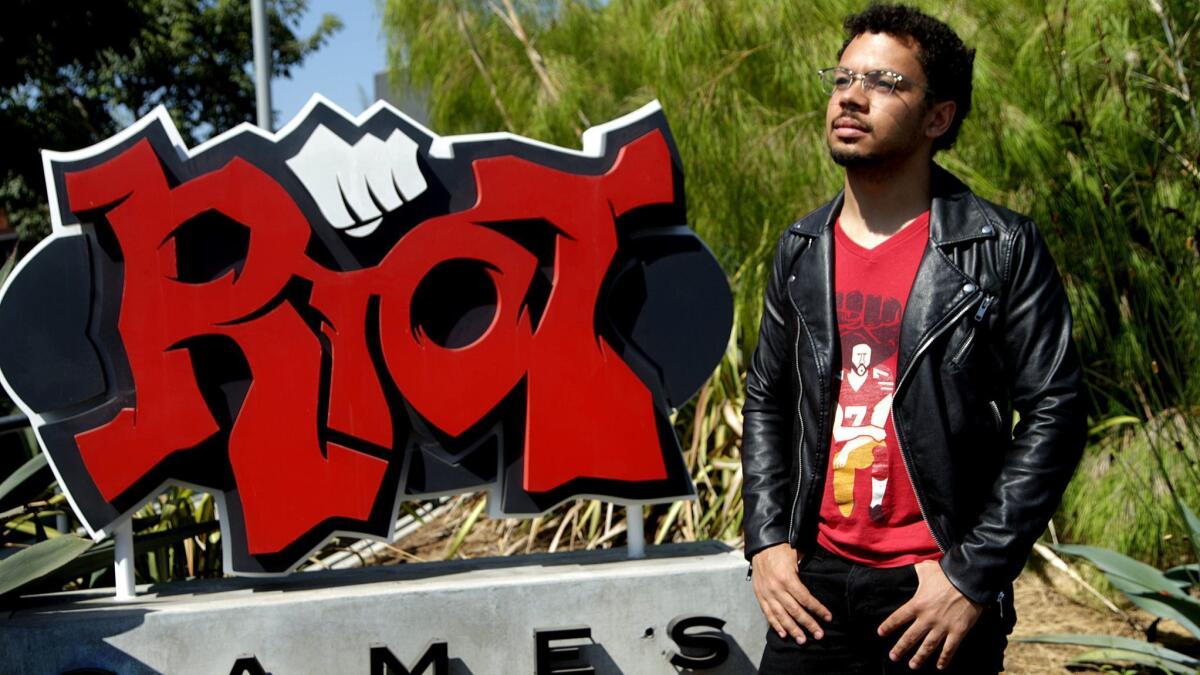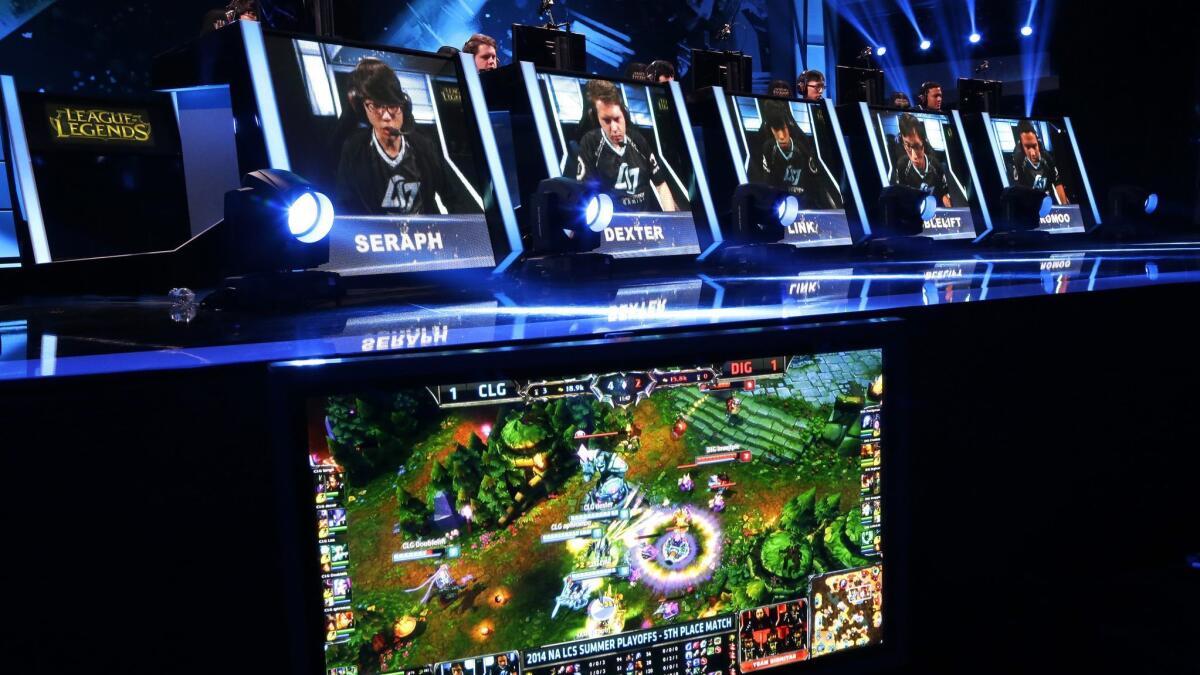Allegations of sexism and harassment roil Riot Games, the developer of ‘League of Legends’

- Share via
Riot Games casts itself as the kind of place where gamers dream to work. Its tricked-out Los Angeles campus features a pirate-themed coffee bar, a gourmet cafeteria and spare workstations where employees can fire up “League of Legends,” the company’s sole title. In what the company calls its manifesto, Riot says it knows “talented Rioters are the key to everything we do,” and “doing the right thing often means upending the status quo.”
But allegations from current and former employees detailing a workplace soaked with sexism and harassment — and what they describe as the company’s largely cosmetic response — have thrown those values into question, and Riot Games into crisis mode.
For the record:
11:20 a.m. Nov. 2, 2018An earlier version of this article incorrectly stated that screenshots of internal Riot communications were leaked to an online forum linked to the Gamergate movement. They were leaked to a Reddit forum about League of Legends, then posted on a Reddit forum linked to Gamergate.An earlier version of this article said a Seattle event at a gaming conference was focused on recruitment. It was an informational event. Also, an earlier version of this article said women at Riot could participate in an internal chat group focused on diversity issues. All Riot employees could participate in it.
In interviews with The Times, 10 current and former employees said they experienced double standards, glass ceilings or sexual harassment at a company where 21 of the 23 senior executives are men and 80% of the total workforce is male.
Four female employees said they found their careers stymied and ideas dismissed. Staffers have leaked internal communications to online forums known for targeting and harassing outspoken women in gaming. Two employees who publicly defended diversity initiatives have found themselves targeted by online mobs and out of a job soon after. Most spoke under conditions of anonymity, citing non-disparagement agreements they had signed upon leaving the company and fear of professional retaliation or online harassment.
In response, a company co-founder has choked back tears in a companywide apology, and Riot’s board has brought in Frances Frei, the consultant whom Uber hired to reform its culture and reputation in the wake of its own sexism scandal.
“The organization today is craving accountability,” Frei said in an interview with The Times. “We have set up a very intense investigative process, and their offices do not seem to be empty.”
Bay Area tech companies have been rocked by workplace sexism controversies in recent years, but Riot is the first L.A. tech company to reckon with a scandal on this scale. With 2,500 employees and $2.1 billion in revenue in 2017, Riot is one of the largest video game companies in the world.
Since its founding in 2006, the company has publicly stated its dedication to encouraging employee feedback and prioritizing results over seniority. But former and current staffers describe a boys’ club made up of longtime employees that punishes criticism, especially from women. The allegations first came to light in an exposé published by the video game website Kotaku in August.
Riot spokesperson Joe Hixson said that the allegations from employees have “highlighted the need for an overhaul of Riot’s culture, systems, and processes,” but could not comment on any specific claims.
Jessie Perlo, who until 2016 worked for Riot’s brand and communications team, said that women were consistently undermined in the workplace — and little changed when they spoke up internally.
“We would share our experiences over and over again,” Perlo said. “I don’t know if it was because we were a minority in the company, but nothing meaningful was done about it.”
All current and former employees who spoke with The Times describe a workplace where women were regularly talked over or ignored. When some women argued their points of view in meetings, they were labeled hysterical or simply excluded from future meetings and promotion opportunities, while men were promoted for the same behavior, the employees said.
Two women said they experienced professional retaliation for asking pointed questions in Q&A sessions with senior managers.
“If anybody felt that way or experienced that then that’s the kind of thing we’re looking to eliminate across the organization,” Hixson said in response. “We really are trying to put a stake in the ground to say we as industries can be much better at these issues, not to excuse the fact that that ever took place at Riot, but to say we can be leaders at this space.”
Three of the employees confirmed Kotaku’s report of sophomoric and sexualized behavior in the workplace, including a running gag that involved male co-workers smacking one another’s genitals.
Barry Hawkins, a former manager who now works at Hulu, wrote an online account of his attempts to get the phrase “No Doesn’t Really Mean No” — an allusion to sexual consent — removed from a recruiting slideshow, only to be overruled by the company’s co-founders, Marc Merrill and Brandon Beck. Hawkins would not respond to The Times’ request for comment. Riot would not make Merrill and Beck available for comment.
Efforts to add new female characters to “League of Legends” were delayed or squashed if their avatars were not deemed sufficiently sexually attractive to men, according to three former employees. “They would say it openly, with women in the room,” one said.
Two former employees described separate incidents — one in an e-mail chain and one in public — in which male employees discussed what it would be like to have sex with female staffers. Co-workers informed both women. “Someone told me, thinking I would take it as a compliment,” one said. “I was like, ‘Oh, no wonder they can’t take me seriously.’”
“We are very much trying to look at what was behavior that occurred in the past that was unfortunate and regrettable and would never fly today and worked its way out of the culture versus things that we need to fix today,” Hixson said. “To the extent that they occurred, they point to an organization growing up and realizing what’s appropriate at a mature company.”
A current employee said complaints to human resources or superiors of harassment or sexism were often met with the advice to confront the harasser directly, in line with the culture of direct feedback endorsed in the Riot manifesto. Many say these complaints often went nowhere.
“You would never expect that sort of homegrown small-company mind-set of nepotism to be able to persist at a company of thousands,” said one employee. “But it does.”
Hixson said Riot has taken action against inappropriate behavior over the years in ways that may not have been noticed by “anybody except the individuals directly involved.”
Frei said that one of her goals at the company is to discover where particular groups are treated differently, and rebuild the company’s internal structures in response.
“I can say that the reason I’ve been brought in is that we’re probably anticipating that there is variance across groups,” she said. “Otherwise, I don’t know that you need me.”
She added that she could not comment on ongoing investigations into misconduct or any decisions regarding personnel or human resources, but that she trusted that the new investigative process would take all allegations seriously.
“Lots of people want a lot of action right now,” she said. “I am deeply comforted by the processes in place — there’s no lethargy, but there is no rush to judgment, and that is really, really important.”
In late August, Riot issued an official response and apology, pledging to reform its internal culture and outlining what it called its first steps to “weave this change into our cultural DNA and leave no room for sexism or misogyny.”
Those steps included staffing up its diversity team and creating an independent investigation system for complaints, run by the large employment law firm Seyfarth Shaw.
“All hands are on deck now,” said Soha El-Sabaawi, Riot’s head of diversity and inclusion, who was hired in 2015. “What looks pretty tumultuous to the public is actually really uniting us. I feel like I almost have an army behind my back at this point to push this forward.”
Riot has also shaken up the power balance of its board for the first time in seven years. Since the Chinese tech giant Tencent paid $400 million to acquire a 93% stake in the company in 2011 (it purchased the remaining shares in 2015), the company’s board has been made up of two Tencent representatives, two Riot representatives and an empty seat, so that neither company had a controlling vote. Now it has brought in an independent board member, Harvard Business School professor and Unilever board member Youngme Moon, to fill the empty seat. A new committee consisting of Moon — the board’s only woman — and the two Tencent directors was created to oversee misconduct investigations into senior executives.

But an incident just days after the company published its pledge to reform threw that commitment into question for some employees.
Riot hosted an informational event at a Seattle gaming conference exclusively for women and gender nonbinary people. Such networking sessions are a common tool for companies looking to diversify, especially in fields such as engineering and game development, which skew heavily male and white compared with the population at large.
The reaction was swift on websites and forums dedicated to decrying social justice and battling the push for more minority representation in video games. The section of the popular online forum Reddit dedicated to “League of Legends” was flooded with comments accusing the company of sexism against men and what they described as far-left policies.
A Riot developer named Daniel Klein took to his personal Twitter account to defend the conference session. After arguing that sexism and underrepresentation in the industry made such events necessary, he said, “I sincerely hope these manbabies crying in that thread will grow up some day.”
Mattias Lehman, an employee and outspoken advocate for diversity in the industry, also used the term “manbabies” in a post on Reddit discussing the backlash. Lehman wrote an article on Medium outlining what he saw as misogyny in self-identified nerd culture.
Angry responses continued to pour in from the public, but retaliation came from a faction inside Riot, as well. A Riot employee leaked screenshots of an internal chatroom where employees discuss diversity issues to Reddit. They soon found an audience on a section of the site created by supporters of Gamergate, a movement known for harassing advocates for diversity in games and game companies.
In an all-company email, Riot head of information security Christopher Hymes wrote that the leak “was a massive violation of trust that fundamentally breaks our ability to communicate openly and honestly with each other,” adding that it “also puts the Rioter [whose] messages were leaked at risk in real life.”
Within days, both Lehman and Klein were out of a job. Riot management later announced to employees that the screenshot leaker was identified and no longer works at the company.
According to Lehman, who ceased speaking with The Times after a non-disparagement agreement took effect, Riot management presented him with an ultimatum: shut up or ship out. He said that the company cited his “manbabies” post in a meeting where the company presented him with the options of leaving or modifying his language on his private social media accounts, but suspects that his outspoken history contributed to the decision.
Frei noted that part of Riot’s success comes from its engagement with its player base, but that “inappropriate engagement” like that of Klein and Lehman would not be tolerated.
When speaking with The Times in early September, Frei said she did not know that screenshots had been leaked to websites known for organizing harassment campaigns against advocates for diversity in gaming. “I was unaware of that,” Frei said. “But this company, I hope, does not attract and retain people with malice in their hearts.”
More than two months after allegations first emerged, tensions have not entirely cooled. An internal app designed for employees to provide anonymous feedback is now home to a debate about whether human resources is sweeping allegations under the rug and protecting senior management from repercussions.
“I feel a lot of people are silently giving up,” one current employee said. “There’s a lot of sadness and resignation to the fact that nothing permanent or meaningful is going to happen.”
Hixson disputes that. “Individuals ranging from junior to very senior levels of the organization” have exited the company since the allegations went public, he said.
“The games industry as a whole is behind the tech industry by 15 years or so,” said El-Sabaawi, who was hired by Riot in 2015. “And the tech industry is probably behind the corporate industry by 20 years or so. There’s a lot of catching up to do.”
Follow me on Twitter: @samaugustdean







